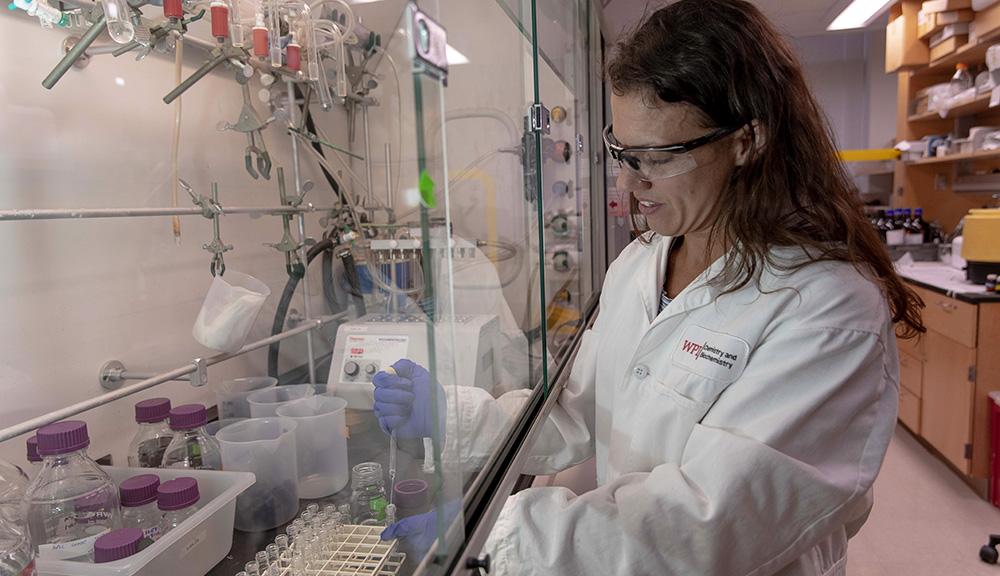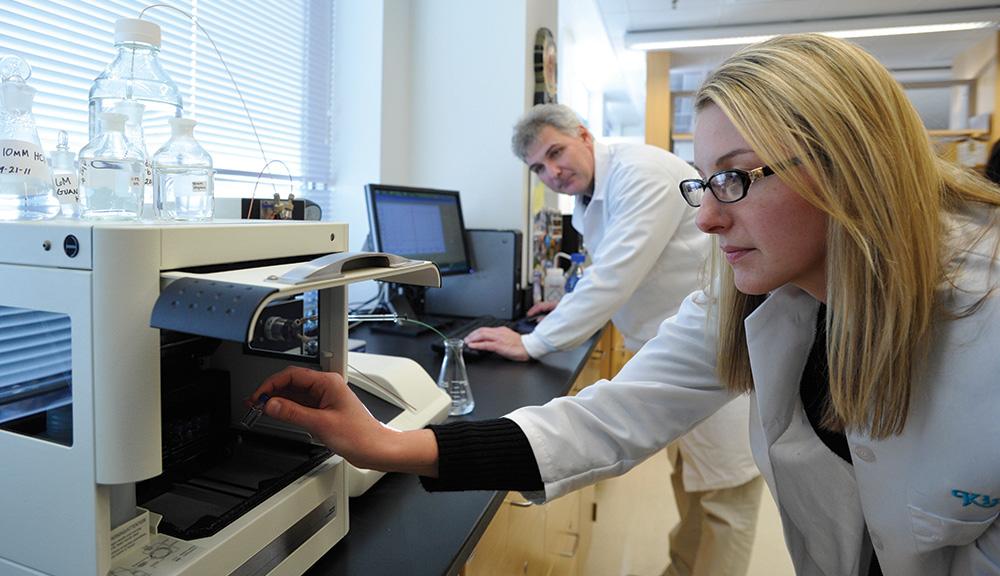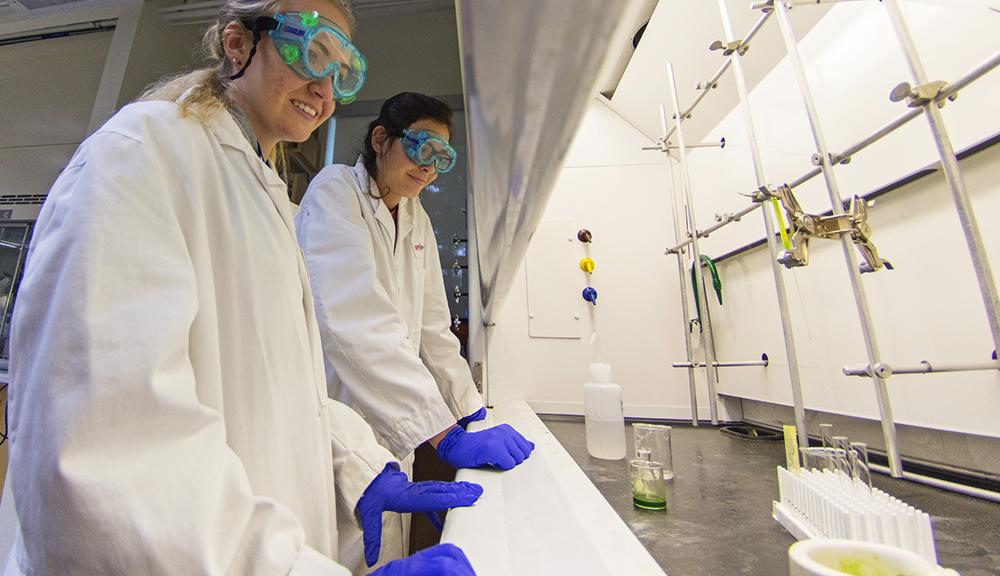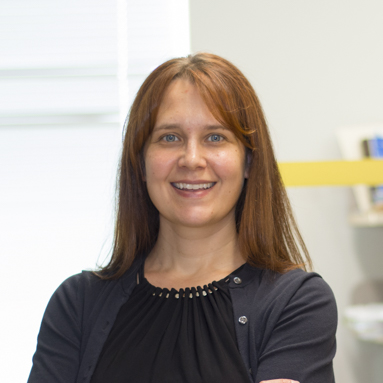PhD in Biochemistry
Description for Image
WPI’s PhD in Biochemistry will give you the interdisciplinary knowledge, rigorous research experience, and hands-on practice to thrive in today’s fast-paced and continually evolving Biochemistry research environment.
You will make your own discoveries as you work alongside expert faculty researchers who are conducting groundbreaking research with potential to change the way we live in areas such as health, nanotechnology, biomedical sensors, and clean energy.
You’ll have access to state-of-the-art facilities like our Life Sciences and Bioengineering Center, an exceptional, interdisciplinary research environment that enables the kind of advances that have a profound impact on society, human health, and our environment.

Our flexible and diverse PhD in biochemistry curriculum encourages students to tailor a program of research and study to their individual career goals. You will complement your immersive research activities with selected courses that enable you to delve into advanced topics of interest in Biochemistry as well as biology, biotechnology, engineering, and more.
You will also have many opportunities to sharpen your professional skills and knowledge: hone your teaching abilities in seminars at WPI’s Morgan Teaching and Learning Center; advance your knowledge in bioprocessing in our newly established Biomanufacturing Education and Training Center; or expand your corporate knowledge through courses in our School of Business.
WPI’s Biochemistry faculty members and students conduct cutting-edge research funded by major federal agencies such as the National Institutes of Health and the National Science Foundation. Our research groups are involved in fundamental and applied research with the potential to change the way we live, in areas such as these:
- heavy metal transport
- metal homeostasis of plants and bacteria
- computational biochemistry/biophysics of membrane proteins
- enzyme structure and function

At WPI, students’ work makes an immediate impact on some of the world’s most pressing challenges.

Students work one-on-one with faculty members to develop a targeted curriculum—so they can combine their interests in science, engineering, and even entrepreneurship.

Whether your interests are in biotech or pharmaceutical fields, or in areas such as energy or rare resources, the opportunities at WPI prepare you for your next steps.

Research at WPI is invigorating, exciting, and innovative.

WPI’s high-tech lab bays are organized by research focus, not departments, and invite multidisciplinary collaboration.

The flexible degree program at WPI means your BCB degree offers a comprehensive plan tailored to your professional and personal goals.
The PhD in Biochemistry program is located within the WPI Life Sciences and Bioengineering Center at Gateway Park, a thriving interdisciplinary research hub. Here, you will be supported by outstanding specialized resources—technology, processes, and technical staff—to advance your research, including state-of-the-art equipment for microscopy/imaging, facilities supporting cell culture work, and a 3,500-square-foot vivarium.
Faculty Profiles







Have questions?
WPI's dedicated graduate student support team can help.
Refer a Friend
Do you have a friend, colleague, or family member who might be interested in a WPI graduate program? Click below to tell them about our programs.
Ready to Advance Your Career in Biochemistry?
Whether you’re already working as a professional in the field or plan to go straight from your master’s into a PhD, a doctorate in biochemistry will give you exposure to rigorous, cutting-edge research and immersive curriculum needed to be competitive in this fast-paced field. Do you have specific questions about a biochemistry PhD salary or about jobs after a PhD in biochemistry? Explore our career outlook for biochemistry to help gauge what a future in the field might look like from salary data to job titles.
Explore More Advanced Degrees in Chemistry
Do you have a passion for diving into meaningful research in the medical, environmental, or green chemistry fields? A PhD in chemistry may be a good fit for you. Our collaborative, one-on-one mentorship empowers students to conduct groundbreaking research in areas like molecular modeling, spectroscopy, enzyme kinetics, and more! Not quite ready for a PhD just yet? Our master’s in chemistry will help get you there. Dive into high-level courses in organic chemistry, life sciences, and even materials research with our master’s in chemistry. Are you interested in the chemistry field, but also have a passion for studying plant chemistry? Our online master’s in chemistry with an optional specialization in medicinal plant chemistry enables students to receive an advanced degree specializing in plant-based chemistry. Advance your career in modern plant-based industries by studying natural product isolation, characterization, and analysis. Do you have a particular interest in the chemical processes that happen within living things? Consider earning a master’s in biochemistry in which you’ll be challenged to conduct high-level research in areas like gene expression and functional genomics.
Explore Gateway Degrees in Chemistry
If an advanced degree is in your future, you’ll need to begin with a bachelor’s degree. WPI’s bachelor’s in biochemistry lets you explore topics at the intersection of chemistry and biology. You’ll get hands-on laboratory experience as you study and unravel complicated chemical processes of living organisms. If you’re fascinated by chemical processes and materials, a bachelor’s in chemistry will build your academic knowledge and give you real-world experience in our cutting-edge labs.
Explore Related Minors for a Broader Understanding of the World Around You
If you are pursuing a major in a different discipline but would like a foundation in biochemistry or chemistry, WPI has minors that will help you find what you’re looking for. A minor in biochemistry or a minor in chemistry will expand your understanding of the world around you while giving you practical, hands-on laboratory experience. These minors are especially valuable for those majoring in biomedical engineering, biology, or chemical engineering. Business majors who have an interest in life sciences work will also find a minor in chemistry or a minor in biochemistry particularly relevant to industry.
The BioPoint Program for Graduate Students has been designed to complement traditional training in bioscience, digital and engineering fields. Students accepted into one of the home BioPoint programs will have the flexibility to select research advisors and take electives in other departments to broaden their skills. BioPoint curriculum is designed to be individual, interactive, project-focused and diverse, and includes innovative courses, seminars, journal clubs and industrial-based projects. Learn more.